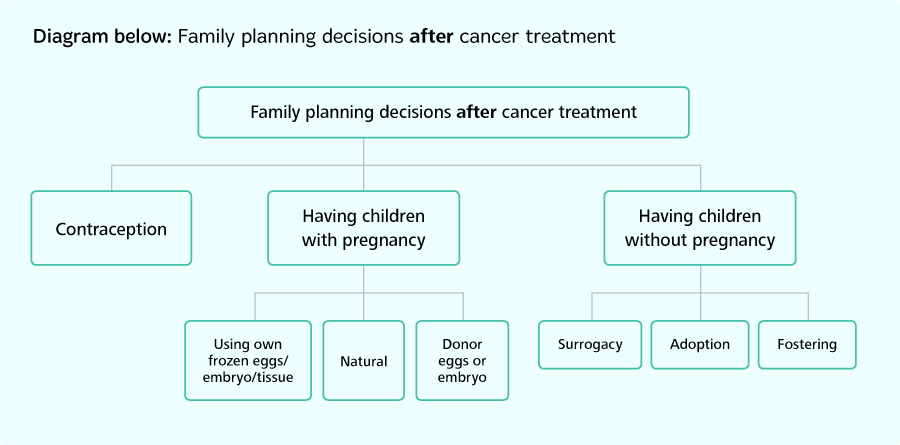Family planning decisions after cancer treatment
For many women, deciding whether to try to get pregnant after a diagnosis of cancer is difficult. During this time, women make decisions about fertility management that best suit their lives. These include having tests to check fertility, choosing a contraceptive method and planning for a future family. This is shown in the diagram below.
It is difficult to predict exactly how your fertility will be affected by cancer treatment. You can ask your cancer care team or GP to refer you to a fertility clinic. The fertility care team can check your fertility through a series of tests. These include blood tests to check your levels of a hormone or an ultrasound scan of the ovaries.
Some women may decide their family is complete or choose not to have any children after finishing cancer treatment. Your fertility may return naturally afterwards. Not all women who have cancer treatment will have a fertility problem in the future. Even if your periods have not started again, you may still be producing eggs and could become pregnant. It is advised that you discuss methods of contraception with your cancer care team or GP. They can advise you on the options and the appropriate type of contraception for you. It is advised to wait for two years after completing your cancer treatment before trying for a baby.
There are no data to suggest that pregnancy affects the chances of a cancer coming back. There are no data to suggest that the health of children born after cancer treatment is affected. If you are thinking about getting pregnant, talk to your cancer care team.

Not all women who have cancer treatment will have a fertility problem, and in fact most young women who want to have a baby after cancer treatment are able to do so. Some women may face permanent loss of fertility after cancer treatment. This can be upsetting and difficult to come to terms with. It might come at a time when a woman is planning to start a family or before a woman’s family is complete.
If this is the case for you, it may be helpful to seek professional support and counselling from your fertility care team. As well as offering emotional support, they will be able to offer information on other options. These include surrogacy, adoption and fostering. They can advise on other methods of assisted pregnancies such as donor eggs and embryos or using your own saved eggs, embryos and ovarian tissue.
The HFEA website www.hfea.gov.uk has more information about egg or embryo donation and surrogacy.
The organisations listed here include information and support for people interested in fostering and adoption.










